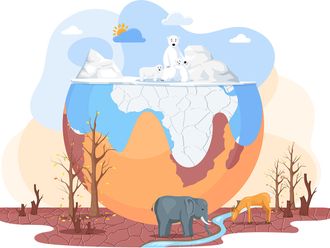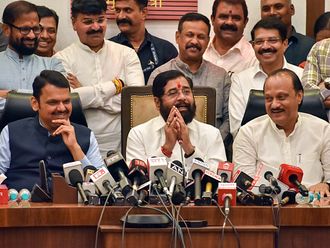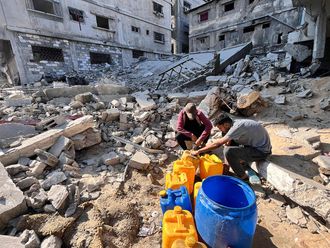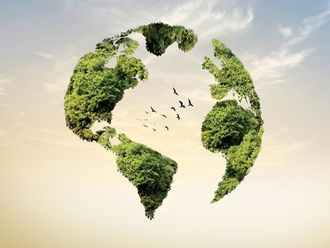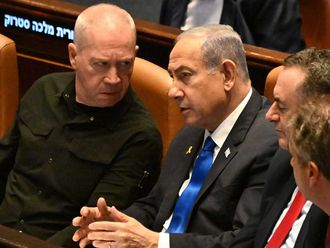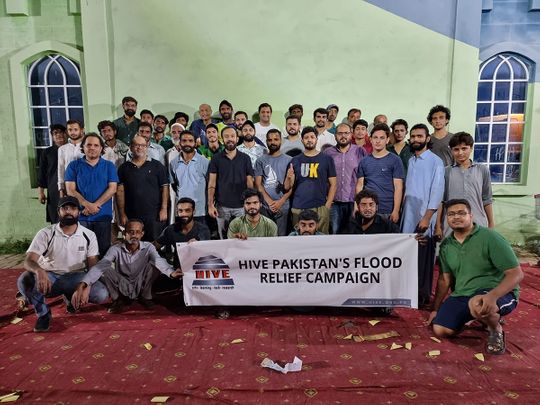
I love autumn rain. Something so gorgeous, drops of water falling on the foliage and structures that transform into special things of beauty in autumn. The last bursts of colours before pre-wintery dullness tiptoes in. An inexplicable bliss blends into autumn’s unobtrusive gloom, and I feel a stillness within me that is peaceful. This year it’s different. This year, rain is the nagging reminder that so much of Pakistan is in great anguish. This year, rain is the blessing that became and continues to be a curse for millions of my compatriots. Not in my little world, but in many, many parts of Pakistan.
Rains of summer unleashed floods of such intensity, United Nations Secretary-General Antonio Guterres saw them as “monsoon on steroids”, and Pakistan’s Minister for Climate Change Sherry Rehman described their reach as that of “biblical proportions”. Reportedly, more than seventeen hundred human lives were lost, almost six hundred and fifty of them children.
While the thirty-three million-plus victims of floods in Sindh, Balochistan, south Punjab and Khyber Pakhtunkhwa await repair of their homes, rehabilitation of their villages, and availability of means to earn money, there are those who, with their timely help, ensure that the victims of floods have clean drinking water, food, temporary shelter, clothes, and basic day-to-day items.
NGOs, social welfare organizations and international humanitarian bodies are working non-stop for mitigation of issues that require immediate attention. Writers, actors, talk show hosts, sportspersons, artists, students, regular folks, so many of them are doing their bit to help, to reassure the suffering millions they are not alone, woh akele nahin hain. Their contribution is invaluable, their empathy heroic.
Islamabad-based HIVE is another set of human beings who endorses the power of humanity and inclusivity as the guiding principles of their work. In the words of its Founder and Executive Director Syed Ali Abbas Zaidi, “HIVE, founded in 2015, is a social-impact organization working to address issues of extremism and marginalization through community-led research, facilitative grant-making, upstream mobilization, innovative campaigning, needs-based mentorship and participatory collaborations. HIVE strives to work for an inclusive, equal, and peaceful Pakistan.”
Leading the flood rehabilitation efforts of HIVE is Zaidi, his team of fifteen dedicated humanitarians, and fifteen hundred volunteers in thirteen cities. Recipient of multiple awards, including the Intercultural Innovation Award 2017 by UN HQ and the Nelson Mandela Award 2021, Zaidi is an activist, researcher, and social-development professional. He also has the distinction of being “one of the ten young development practitioners handpicked by former UN Secretary General Kofi Annan to represent the anti-extremism movement ‘Extremely Together’ globally.”
For the last few weeks, HIVE PAKISTAN’S FLOOD RELIEF CAMPAIGN 2022, under the guidance of Zaidi, is focused on providing assistance to the victims of Pakistan’s 2022 floods.
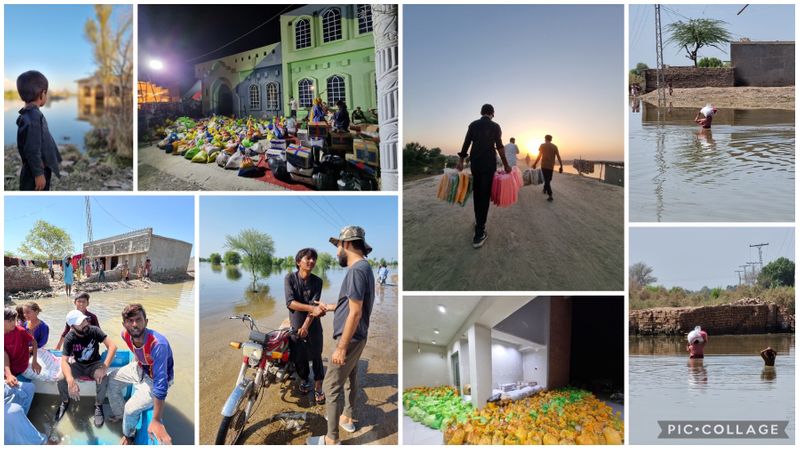
For Gulf News, I asked Syed Ali Abbas Zaidi a few questions:
Mehr Tarar: What is your assessment of the devastation of the 2022 floods?
Syed Ali Abbas Zaidi: I have never witnessed anything like it. It is not just a disaster, it is a humanitarian catastrophe, a climate carnage. I worked extensively during the 2010-2011 floods, but the 2022 floods have caused much more damage. And that is because this year, unprecedented rains added to the flooding caused by breaching of waterways. In some areas, it rained eight hundred percent more than the two-decade average, and hence we saw unquantifiable flooding and destruction caused by rains.
How is HIVE helping the flood affected people of Pakistan?
We are a social impact organization that is working with marginalized communities across Pakistan for the last two decades. Responding to desperate calls for help from our network members, we launched a hundred percent volunteer effort with zero overheads for donors, challenging the practice of charging management fees and administrative costs that are a norm in the broader development sector. We made this decision because we thought our community linkages, vast experience and innovative way of working carried an impact potential, and we wanted to contribute towards addressing the disaster that was upon our people. Our time, connections, office space, logistics and expertise are all contributed by ourselves whilst hundred percent of the donated funds go towards flood relief.
We undertake a multi-layered needs assessment from independent sources in the affected areas, and that informs our day-to-day plan of action and prioritises our response. After the needs-assessment is complete, we make instant deliveries and distribute relief items by hand to the affected. We feel distribution is the mainstay of relief efforts, and therefore, we spend considerable time on identifying the most affected persons, hand over tokens, and execute the distribution within a few days.
We have, so far, [until October 10] made eight deliveries to thirty-five villages in Khyber Pakhtunkhwa, Sindh, south Punjab and Balochistan, in just thirty-eight days of launching our flood relief response. HIVE has raised over eighteen million rupees through crowd fundraising; travelled fifteen thousand kilometres; provided relief to over 139,245 persons; distributed relief items weighing over fifty tons; and treated two thousand and forty-three patients.
To reach the hardest hit areas, we give special attention to selecting villages that are remote and not easily accessible through main roads.
What are the current major requirements in the flood-ravaged areas?
It is very hard to give a one-size-fit-all recommendation regarding requirements in flood-ravaged areas. Different contexts have different emerging needs that shift swiftly, even unpredictably. Food supplies, clothing, beddings, and medicines will remain a priority for those who have lost their sources of income.
We noticed malaria and dengue epidemics surging in some areas of Sindh, and therefore, anti-mosquito items are much needed there.
Clean drinking water is urgently needed because waterborne diseases are wreaking havoc in some areas. Skin diseases, eye infections and other floods related illnesses need to be addressed as well.
Women and infants have unique needs that are often ignored.
Affected persons, living below the official poverty line even before the floods, would need sustained monetary support for them to even think about rebuilding their mud houses.
Once the water has receded, small scale farmers would need machinery and agricultural items to have a semblance of normality and to start their regular cycle of life.
Overall, we feel addressing this disaster would require sustained care, love, and support from citizens.
Being directly involved in fund raising and collection and delivery of food and other essential items to people in urgent and great need, what do you think are the main issues vis-à-vis providing immediate aid and ensuring long-term rehabilitation of the millions of flood victims?
I think an important issue that needs attention is the attitude of some relief workers and donors who, albeit in good intention, provide relief according to their own thinking instead of actually spending time with the affected communities and learning what the needs really are. This has to be a bottom-to-top approach. For example, if we send extra tents in a village that received one thousand tents last week, it is going to create a black market of donated tents and other shelter items, as the affected people may want to sell the extra supplies to get money for their other urgent needs. The donated stuff will not sell at their original value and, only the middleman will benefit.
I have also seen many safaid-posh [low-earning people] families getting ignored because they do not wish to beg or stand in line for relief. This is where relief distribution needs to be properly planned and executed according to the emerging situation on the ground instead of relief workers’ priorities.
Another issue is donor fatigue that will impact sustained support to hard-hit areas.
Alongside relief work, uninterrupted advocacy about the scale of this catastrophe needs to take place that sensitizes the national, regional and global affluent communities about the help required in the long term.
Lack of coordination between government departments, public representatives and district administration is an elephant in the room that should be immediately addressed via policy measures.
Rehabilitation is a different ballgame that would require a massive governmental buy-in because it is primarily our governemnt’s responsibility to provide housing to the affected persons. Government’s transparency and data sharing would be vital if it envisions civil society contributing to its full potential to the rehabilitation efforts.



